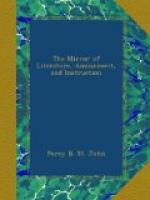The suppression of “the order” of minstrels, gave rise to that of the Ballad-singers, who relied upon the quality of their voices for success. The subjects of many of the songs handed down by the minstrels were still held in honour by the ballad-singers. The feats of “Elym of the Clough,” “Randle of Chester,” and “Sir Topaz,” which had faded under the kind keeping of the minstrels, were now refreshed and brought more boldly in the new version before the sense. Robin Hood and Friar Tuck had their honours enlarged by the new dynasty; more maidens and heroes were inspired by their misfortunes. Drayton’s allusions to the propagation of Robin’s fame may give an idea of the diffusion of the ballad-singers:
“In this our spacious isle I think
there is not one,
But he hath heard some talk of him and
Little John;
But to the end of time the tales shall
ne’er be done,
Of Scarlock, George-a-Green and Much the
Miller’s son.”
The new race started in the field with the full tide of popularity; they had the glory of being opposed to and triumphing over the votaries of the muses. The poets of the first class confessed their uneasiness at the success of the innovators. Of this fact we have abundant instances in Spencer’s “Tears of the Muses,” and the mighty Shakspeare would bring the calling into contempt.
The ballad-singers did not enjoy empty popularity, as may be understood from the number of candidates who yearly sought refuge in their camp. One of the most popular singers of this early time was a boy, distinguished from the nature of his voice “Outroaring Dick,” as honestly bestowed as any hero of “jaw-breaking” memory in Greek or Latin history. His earnings, according to Mr. Warton, averaged ten shillings a day; he was a well-known character in Essex, and was not missed for many a day from Braintree fair; and in the decline of life spent his days like an amateur. But Cheetre, for such was his real name, was haunted amidst his glory by a rival. Will Wimbars had a voice of as much flexibility as Dick. Dick was the most popular, for he sang every thing he could, but Will had a select list he never departed from. The former was sought as a companion; the latter pleased best in the public exercise of his talents.
The most universally esteemed singer of his age was Mat. Nash, who had a vehement style; his “Hunts-up,” a song which obtained him “much favor,” was one of his most celebrated efforts. However, it happened that the great Secretary Cecil was so captivated with his singing, that he soon enabled him to retire from his profession.
The accident that led to this fortunate reconnoitre is not impertinent to our subject: in a time of dearth, which was severely felt in the city, the famous ballad-maker Delone composed a song reflecting on her Majesty. The ballad-maker and singer were both committed to the compter, but the poet defied government even while in the lion’s den. In a letter to the Lord Mayor, he avowed the ballad, and justified it. Nash, in the meantime, in an interview with the Secretary, established his innocence, and laid the foundation of his future prosperity.




